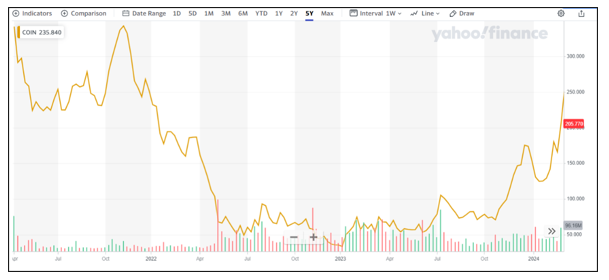 |
| By Chris Graebe |
Although I’m known primarily as a startup guy, I pay attention to investments of all sorts.
And lately it’s been nearly impossible to ignore what’s going on in cryptoland.
Everywhere I turn, I read or hear about Bitcoin’s (BTC) bull market rally and how it touched an all-time high of $73,750 earlier this month.
It reminds me of the hype when OpenAI released ChatGPT in late 2022. In short order, investors fell madly in love with AI and crazy returns delivered by a handful of key players.
While crypto can definitely create AI-type hype — positive and negative — attracting mainstream investors has been the biggest impediment to growth.
I’ve found, for the most part, that people either love or hate crypto as an investment. In fact, I’d say there’s almost as much division between its fans and foes as the two parties hanging out on Capitol Hill.
The biggest crypto camp is overflowing with folks who think it’s a scam and will never be convinced otherwise. Highly publicized events such as Sam Bankman-Fried’s FTX debacle and the collapse of several other lenders doesn’t help the case.
In the much smaller camp are supporters who’ve religiously followed crypto’s evolution. Their fandom began as observers when the first Bitcoin sold in 2013 for almost nothing, to actively investing in Bitcoin as it soars to record highs.
You can’t blame the inability to attract a broader group of investors on a lack of effort from crypto proponents. On the contrary, they’re doing everything in their power to make it a household name like any AI-focused stock or ETF that trades on the New York Stock Exchange.
That mission was partially accomplished when the Securities Exchange Commission gave its blessings to nearly a dozen asset managers to allow ETFs that hold Bitcoin to trade on the NYSE.
In addition to making crypto more accessible, ETFs make it possible for investors to now trade digital currencies without holding them, carrying a digital wallet and navigating complicated crypto platforms.
Above all, the new ETFs align crypto with some semblance of oversight and regulation. As a result, investors poured an estimated $20 billion into the top nine leading Bitcoin ETFs through their first seven weeks.
Those inflows have a lot to do with the dramatic rise in Bitcoin prices from the $16,000 it traded for in late 2022. The rally, which started in the second half of last year, resulted in a six-month gain of 165%.
The “mainstreaming” of crypto has also ushered in a new wave of financial advisers that oversee $30 trillion in client assets.
But what really piques my interest, and should do the same for you, is the melding of crypto and private equity. It’s an investors’ match made in heaven if you ask me.
And more and more startups are cropping up in the crypto field.
A cool thing about crypto startups: They’re all about security and transparency, two of the qualities average investors prioritize. That’s because the vast majority of these businesses use blockchain technology to create new products and services.
Blockchain is a ledger that stores digital information in a secure way. It can be used to track the movement of assets, to make payments and to verify the identity of people.
This means that everyone can see how assets are being moved and payments are being made. It is also difficult to hack, one reason it is often used for financial transactions.
What really sets investments in crypto startups apart from buying coins, ETFs or shares of publicly traded companies in the space, is the potential to capture profits akin to Bitcoin on steroids.
Here’s a great example …
Coinbase (COIN), the largest U.S. cryptocurrency exchange, went public on April 14, 2021. Shares closed at $328.28 on its first day of trading and subsequently fell 80% one year later.
To this day, COIN still trades below that opening day mark.

On the other hand, apart from the company’s founders and internal stakeholders, its earliest investors hit the biggest jackpot. Some of them made 8,000 times their initial investment.
Garry Tan, the founder of Initialized Capital, is one of many venture capitalists I found while researching.
He invested $300,000 in Coinbase in early 2013 for 15 cents per share. That investment is now worth $2.4 billion!
Tan described it as his “best startup investment yet” on X.

Getting in on the ground floor of a company with innovative products that fill a niche like no others do is the key to success.
And, right now, many crypto startups are hell bent on developing products that make it easy and simple to buy and sell coins.
Companies with these mainstream friendly goals will attract the most attention and funding. Of course, I require that any startup pass a number of litmus tests before I recommend investing a single penny.
And the crypto startup landscape is starting to blossom after the “crypto winter” in 2022 made it harder for founders to raise money.
According to PitchBook, venture funding for crypto-related companies in Q4 2023 totaled $1.9 billion, a 2.5% increase from the prior quarter. This marks the first time since “winter” that investments in crypto startups have risen.
Some of the most notable and successful crypto startups focus on challenges in desperate need of solutions. They include the tokenization of real-world assets like real estate and stocks on the blockchain … and decentralized computing infrastructure.
Here are a few of the most recent and notable fundraises:
Crypto exchanges, Swan Bitcoin and Blockchain.com raised $165 million and $100 million, respectively.
The quarter’s largest deal was a $225 million investment in Wormhole, an open source blockchain development platform company, backed by the likes of Coinbase Ventures, Jump Trading and ParaFi Capital — at a $2.5 billion valuation.
Meanwhile, Together.ai, a decentralized cloud platform, raised $102.5 million in a Series A round led by Nvidia (NVDA), Emergence and Kleiner Perkins — at a $463.5 million valuation.
I will continue to watch this space for future opportunities, especially any that fundraise through crowdfunding.
But there are other ways to take advantage of the huge opportunity in lesser-known cryptos.
Namely, what our lead crypto analyst Juan Villaverde calls “new cryptos.” Click here to see how they rose 205x more than Bitcoin … and could again.
Happy hunting,
Chris Graebe

